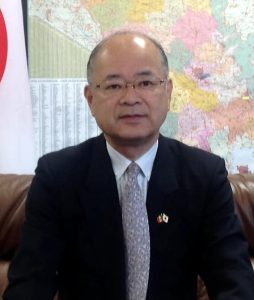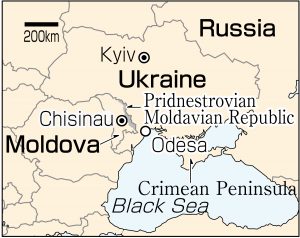Views on Ukraine invasion from A-bombed Hiroshima’s perspective: Yoshihiro Katayama, Hiroshima native and Japan ambassador to Moldova
Jul. 22, 2022
Reasons why small nation of Moldova accepts refugees from Ukraine
by Michiko Tanaka, Senior Staff Writer
Moldova, situated on Ukraine’s southwest border, is one of the poorest nations in Europe, yet it actively accepts refugees fleeing Russia’s invasion of neighboring Ukraine. Yoshihiro Katayama, 64, Japan ambassador to Moldova who is originally from Hiroshima’s Saeki Ward, believes Moldova might be driven by the trauma that country endured from its history of domination by various world powers. What is the reality faced by Moldova, a diminutive country that nonetheless continues to offer as much support as possible?
Around 2.7 million people live in Moldova, whose land area totals about the size of Japan’s island of Kyushu. The small country has been inundated with more than 520,000 Ukrainian refugees following Russia’s invasion.
While some refugees have fled to other neighboring countries, around 80,000 Ukrainians remain in Moldova, with 90 percent of them staying with ordinary families that have volunteered to take them in.
Moldova is a poor country with no large-scale industry or natural resources, with 800,000 to 1.0 million people of the total population having left to work in Russia or other European countries. Still, the people seem to possess a particularly strong consciousness of support and assistance resulting from their understanding of the suffering of others. That could be because the country, from long ago, has been embroiled in competition—among Turkey, Russia, Romania, and other powers—that has repeatedly altered its borders. The country simply does not abandon others in need.
For refugees, the government opened college dormitories and an international exhibition hall in Chisinau, Moldova’s capital, as soon as Russia launched its attacks. Moldovan’s citizens also began their support for the refugees in such ways as distributing food as well as accepting into their homes women and children who had barely escaped with their lives. Moved by the people’s dedication, embassy staff also set about providing food and clothing.
Moldova became an independent country after the fall of the Soviet Union in 1991. The current government is pro-Western, but there is a region in the east of the country over which pro-Kremlin residents have effective control, proclaiming it as the “Pridnestrovian Moldavian Republic.” In April, after the Russian invasion of Ukraine, a series of suspicious explosions occurred there.
Tensions grew when the explosions were reported by the media along with images. Speculation implicating Russia in the incidents was rife, but it remains uncertain whether that was truly the case. There was minimal chaos after that, fortunately, but the situation needs to be observed closely, with what appear to be roughly 1,500 Russian soldiers illegally stationed in the area since 1992.
Moldova’s people seem to be vaguely anxious about a possible invasion of their country by Russia. The port city of Odesa in Ukraine, one of the front lines in the war, is located only dozens of kilometers from the border with Moldova. I understand the number of new applications for passports has surged, and many refugees, just to be safe, actually have gone on to stay with relatives or friends living in neighboring countries.
The daily lives of Moldovan people are being affected by the war. Moldova is heavily dependent on Russia for its energy supply: for example, almost 100 percent of its natural gas is imported from Russia. Prices of electricity and gasoline as well as public transportation are on the rise. The cost of living overall is soaring with the halting of food and industrial imports from Ukraine.
Moves are underway to ease their plight. Japan’s national government decided to provide 200 million U.S. dollars (approximately 27.6 billion Japanese yen) in emergency humanitarian aid to the Ukrainian refugees by April. Support is also reportedly being distributed through international aid organizations to refugee host families in Moldova.
A team of specialists, including one from Hiroshima University, was dispatched to Moldova by the Japan International Cooperation Agency (JICA) to conduct careful assessment about the kind of medical assistance necessary at this time. Doctors and nurses sent by Japanese non-governmental organizations continue providing compassionate care, something of which I am very proud.
Most share the desire to end this tragedy as quickly as possible. I resided in Ukraine from 2004 to 2008. The current situation, in which one of my favorite cities is being destroyed and innocent people are losing their lives, is unbearable. Japan must continue making the utmost in diplomatic efforts as a member of the Group of Seven industrialized nations (G7).
Russia President Vladimir Putin’s hints at the possible use of nuclear weapons were regrettable. My now-deceased mother was an A-bomb survivor. The president of Russia, a nation that is a permanent member of the United Nations Security Council, should take more care in recognizing the impact of his words.
Profile
Yoshihiro Katayama
Graduating from Ritsumeikan University’s College of Economics after finishing Hatsukaichi High School, Mr. Katayama entered Japan’s Ministry of Foreign Affairs in 1980. After working in the ministry, and then at Japan’s embassies and consulate generals in Romania, New York, and other locations, Mr. Katayama assumed his current post as ambassador to Moldova in February 2020. He is fluent in English, Romanian, and Russian.
(Originally published on July 22, 2022)









